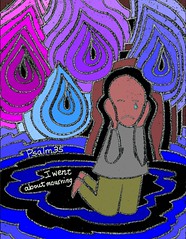I am pretty thoroughly churched. I have been a member of the same Presbyterian Church since I was baptized there as an infant -- and I'm no spring chicken. Usually when I am out of town I either don't go to church or I go somewhere on the spur of the moment and don't bother trying to scope it out in advance. For some reason this last weekend was different.
I knew I was going to be out of town on vacation. I told Google maps to search the area around my hotel for the word Presbyterian. I found a PCUSA church .2 miles from my hotel. I went to the web site -- pretty normal. I decided to go to Sunday service -- and then I started having questions.
I thought it might be interesting to post some of those questions here. The first question I had was what the church looked like. Since I was walking to it I wanted to make sure I would recognize it. There was not a single picture of the outside of the church on its website. There were some interior pictures, but not really of the church. There were pictures of events and people at events with a little of the church in the background. The sad thing is that this church is visually very impressive. Also, it is one of the few older churches I have been in that were renovated in the '50's without just screwing up the old stuff. I found a street level view on Google maps which showed me where I was going. In my opinion this chuch would be well served to discreetly put up pictures that do a little showing off.
Second, I checked the Sunday School class listing. Frankly, the class descriptions were written for people who already go there. Even as a long time member of an Adult Education Committee, I would have had a hard time deciding where I would be comfortable walking in.
The course descriptions were really irrelevant, however. This is a point that I am raising with my church's web mistress, by the way. If I had known exactly which class I wanted to attend, I couldn't have just shown up there. I couldn't have found it. They did include a room name for each course description -- but no map. Now, I challenge you to stand outside of a strange church and decide which door to enter to find Fellowship Hall or Pastor's Study. I realize a lot of people won't be comfortable putting a map on a web site. So, why not say something like, "Map showing location of classrooms available inside this door."
The Church's website very thoughtfully told me to expect a beautiful, traditional service at 10:45 -- and it was right. It also mentioned another service earlier that morning, but only by the name of the service. I haven't a clue what to expect if I showed up for that, and since I still don't have a clue, you can figure that nothing made me curious enough to want to find out.
Another problem that my Church shares is that the web site is static. The web site was built to last with few regular updates. Particularly for websites created in local software that have to be republished every time a change is made, this makes a lot of sense. In the days of web-hosted development software and collaberative web sites (think Joomla -- look it up), a static web site doesn't make as much sense anymore. During the service either the Pastor mentioned, or it was printed in the bulletin, that the Church has a Facebook page. Clearly, Facebook is going to be used to enable easy web activity. Except that you can't anonymously check out a Facebook page -- ok, you can; but not nearly as easily as you can scope out a web site.
Also, I got a very clear idea in my mind's eye from the church website and Pcusa.org's congregational statistics that this was an aging (and possibly dying) congregation. I was surprised at the number of younger people. I was also surprised by the amount of activity in the church community. The image that the web site created didn't match the image I found when I arrived -- and the image I found was much more appealing.
Speaking of arriving, I got there early (in part because it didn't take me as long to get there as I thought). I was not the first person in the Sanctuary, but if I hadn't been a life-long Presbyterian I would not have found a bulletin. The ushers were not in position, and the bulletins were not in plain site.
I also found a reference on the web site to the fact that I was going to be there for World Communion Sunday. I also found a reference to a decision earlier this year that this Church would be celebrating Communion the first Sunday of each month. So, I knew from two sources that this would be a Communion Sunday. Nowhere on the web site (although it was announced by the Pastor) did it mention that the Communion table is open to all Baptized Christians. If I hadn't known that I might have chosen to go somewhere else for fear of not knowing the rules.
On the Sunday morning schedule on the web site it did mention "Fellowship" after the 10:45 service. I assumed that meant coffee and donuts, because I'm a Presbyterian. It actually meant coffee, punch, donuts and cookies. Coffee should always be made clear and cookies deserve to be advertised.
I must admit that being a life-long Presbyterian I was not surprised that no one sat down on my pew after I did, and although several people shook my hand and smiled at me during the Greeting/Passing of the peace -- whatever you call it; only one person introduced herself and showed any interest in who I was and why I was there. This was not a large Congregation. Everyone in that room knew I was visiting. Also, I went to the Fellowship Hall (which the Pastor very helpfully pointed out the door to during the service) for coffee after the service. I milled around a sparsely populated room for 15 or 20 minutes while drinking a cup of coffee. Not a single person said hello to me. That is not a criticism of this church by the way. I doubt the results would have been different at my church.
I hope that no one feels I am being unfairly critical of this particular Church. I have been careful not to name it or identify it in anyway, because I don't think that these criticisms are of this Church. I think that most PCUSA web sites have a lot of the same weaknesses. That is why Grace and I agreed to deviate from our usual topics to post this. We were hoping to start some discussion (or at least thought) about what our respective web sites say to the world and if that is the message we want to broadcast.
JusticeSeekerJusticeSeekerOK@aol.com















